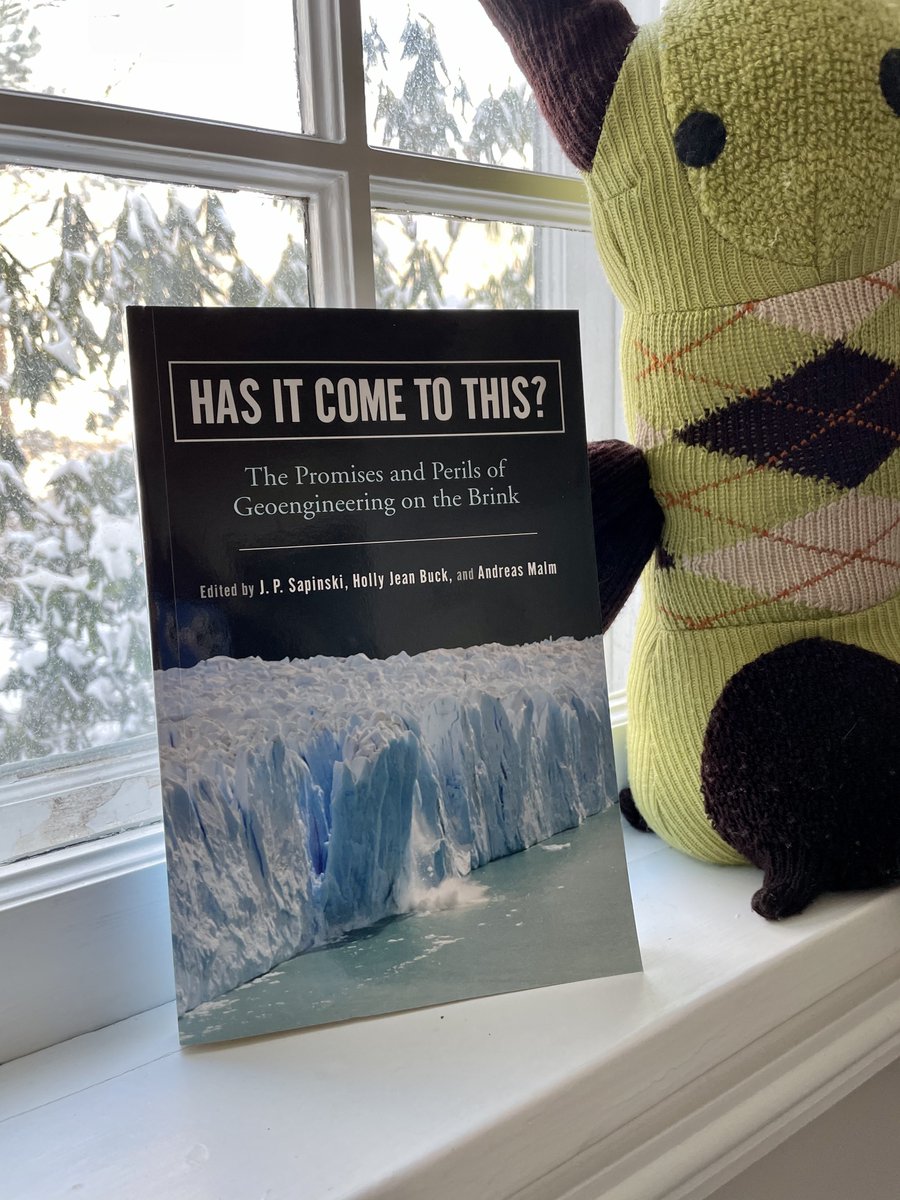It's here! Looking for slow, cool takes on carbon removal and solar geoengineering? Check out the 15 chapters from 20 thinkers in this volume. In this thread, I'll simply share a favorite line from each chapter. (1/n)
Ch. 1, Intro: "We set out this diverse collection of voices not as a monolithic, unified take on geoengineering but as a place where creative thinkers, students, and interested environmental and social justice advocates could explore nuanced ideas in more than 240 characters."
2: @InaMoller notes ~330 ppl engaged in geo, w/ ~100 as a "dedicated core"
"Scientists who study scientific networks also call them 'invisible colleges': informal communication networks of approximately one hundred elite scholars... who confer power and prestige to one another"
"Scientists who study scientific networks also call them 'invisible colleges': informal communication networks of approximately one hundred elite scholars... who confer power and prestige to one another"
3: @wim_carton "Since IAMs are designed to minimize mitigation costs, this means that they by definition select for the most gradual reduction in fossil fuel use. ... Some of this 'gradualizing' of the mitigation curve is done quite explicitly by modelers themselves."
4: @lilifuhr "Geoengineering's reductionist way of dissecting the world into carbon-storing and sunlight-reflecting entities is hostile to a holistic, integrated appreciation of ecological systems ... It commits an extreme form of 'ecological epistemicide.'"
5: @kylepowyswhyte If CDR advocates "already approach landscapes as 'prairies' or take for granted how power plants got to be in the places they are in the first place, then I don't think it will be possible to implement [CDR] schemes that are beneficial to Indigenous peoples."
6: @mclaren_erc writes about recognitive justice:
"To fail to acknowledge diffierential vulnerability to climate change, or to geoengineering, is a failure of recognition too."
"To fail to acknowledge diffierential vulnerability to climate change, or to geoengineering, is a failure of recognition too."
7: @tsikka writes on an intersectional approach to geoengineering:
"The lack of tangible research examining the role of race in shaping the trajectory of geoengineering or factoring it in as a significant variable in any assessment of effects is striking."
"The lack of tangible research examining the role of race in shaping the trajectory of geoengineering or factoring it in as a significant variable in any assessment of effects is striking."
8: @laurencedelina "When limited resources - time most especially - must be efficiently spent, geoengineering only reduces and crowds out our available time, which can be better spent toward the diffusion of already provent and demonstrated sustainable energy technologies."
9 "ExxonMobil studies geology, but we don't reject geology just because they misuse it. Nor do we reject railroads simply because the Nazis used railroads. Similarly with CDR, the misuse of it by fossil fuel corporations is not a legitimate basis upon which to reject it" -Parenti
10: "In a rapidly warming world, more or less everyone - the denialists, the geoengineers, the champions of cuts - seems to be convinced that climate change can only be tackled by planning. We might just as well be honest about it." - Andreas Malm
11: @aepasek on "Provisioning climate":
"When analyzed as infrastructure, geoengineering can no lonerg be taken as a simple technofix - such matters are not simple, because new infrastructures imply new social formations that shape and are shaped by them."
"When analyzed as infrastructure, geoengineering can no lonerg be taken as a simple technofix - such matters are not simple, because new infrastructures imply new social formations that shape and are shaped by them."
12: Richard York on Atlantropa:
"This comparison shows how the geoengineering proposals of the 21st century fit in a tradition of ill-conceived imperialist projects that treat the earth and humanity as things to be manipulated to sustain prevailing power relations."
"This comparison shows how the geoengineering proposals of the 21st century fit in a tradition of ill-conceived imperialist projects that treat the earth and humanity as things to be manipulated to sustain prevailing power relations."
13: @KevinSurprise writes on "Gramsci in the Stratosphere":
"The second contradiction - emerging via climate risk to financial stability, massive costs of decarbonization, and increasing rate of change - is the crisis for which SAI is emerging as a potentially key tactic."
"The second contradiction - emerging via climate risk to financial stability, massive costs of decarbonization, and increasing rate of change - is the crisis for which SAI is emerging as a potentially key tactic."
14: @NilsMarkusson @DTyfield @jenniecstephens @madsdg observe the rise of new nationalist populism across the US and Europe.
"What do these latest developments suggest for the future envisioning, development, and deployment of climate engineering?"
"What do these latest developments suggest for the future envisioning, development, and deployment of climate engineering?"
(They analyze climate engineering's co-evolution with three scenarios: a continued neoliberal regime, an illiberal regime, and an emergent 'liberalism 2.0' centered on China.)
15: last chapter is an essay on "Prospects of Climate Engineering in a Post-truth Era," which considers CDR and SRM research and implementation in post-truth conditions.
Do check out the collection if you're interested in another mode of discussion on carbon removal and SRM!
Do check out the collection if you're interested in another mode of discussion on carbon removal and SRM!
also - many thanks to J.P. Sapinski, who did most of the work in putting this together! It can be bought here or from your favorite bookseller - https://www.rutgersuniversitypress.org/has-it-come-to-this/9781978809352

 Read on Twitter
Read on Twitter


